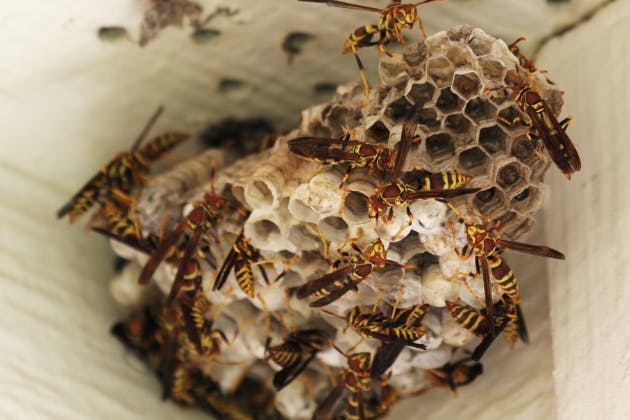A wasp nest on your property is more than just an unsightly nuisance - it can pose serious risks to both your home's structure and your family's safety. This comprehensive guide explores the potential damage wasps can cause and what you can do about it.
For professional wasp nest removal Petersfield, Gosport, Fareham and Portsmouth get in touch with us on 07501702101 and we'll be happy to help.

Where Wasps Typically Build Their Nests
Wasps are opportunistic creatures, seeking out sheltered locations that offer protection from the elements and easy access to food sources. In residential settings, these insects often favour areas that provide both security and proximity to human activity.
Common nesting sites include:
Attics: The warm, dark environment of attics proves irresistible to wasps. These spaces offer ample room for nest expansion and protection from predators.
Wall cavities: Gaps in exterior walls or spaces behind siding provide ideal nesting spots. Wasps can enter through small openings and establish their colonies within the walls.
Floorboards: Voids beneath floorboards, particularly in older homes, can serve as suitable nesting locations. These areas offer protection and are often undisturbed.
Cupboards and wardrobes: Seldom-used storage spaces can attract wasps seeking quiet, dark environments for their nests.
Roof eaves: The undersides of roof eaves provide shelter from rain and wind, making them attractive nesting sites.
Sheds and outbuildings: These structures often have numerous entry points and offer relative seclusion for wasp colonies.
Potential Damage Caused by Wasp Nests
Structural Damage
When wasps build nests in or around your home, they can cause various types of structural damage. These industrious insects often chew through building materials like timber and plasterboard to expand their nesting sites. They'll strip wood fibres from fencing, decking, and cladding to create their papery nests, gradually weakening these structures over time.
In your loft or walls, wasps might damage insulation whilst building their nests. They can also create holes in plasterboard or timber cladding as they establish entry and exit points. Over time, these holes can allow dampness to seep in, leading to water damage, mould growth, and deteriorating structural integrity.
Wall Cavities
When wasps nest inside wall cavities, the damage often goes unnoticed until it becomes severe. Their nests can block ventilation systems and create moisture traps within walls. This trapped moisture may lead to rot in wooden structures and create an ideal environment for mould growth. Additionally, abandoned nests can attract other pests looking for shelter, compounding the problem.
The weight of large nests, particularly those built by species like European hornets, can cause ceiling materials to sag. In extreme cases, these heavy nests might even break through plasterboard, especially if they become waterlogged due to roof leaks or condensation.
Electrical System Risks
One of the most serious potential hazards comes from wasps nesting near electrical installations. These insects sometimes build nests in electrical boxes, metre housings, or around outdoor lighting fixtures. Their nesting materials can interfere with electrical connections, potentially causing short circuits or even fires. The moisture from their activities can also accelerate the corrosion of electrical components.

Factors Influencing the Risk of Damage
Nest Location
Nests built in structurally critical areas, such as load-bearing walls or near electrical systems, pose a much higher risk than those in less vulnerable spots. When wasps choose to build in these sensitive areas, the potential for serious property damage increases significantly.
Nest Size
The sheer size of a nest plays a major role in potential damage. Mature nests can house thousands of wasps and weigh several kilograms, creating substantial pressure on surrounding structures. As colonies grow, so does their impact on your property.
Duration of Infestation
Time is a critical factor in wasp-related damage. The longer a nest remains undiscovered or untreated, the more opportunity wasps have to expand their colony and potentially compromise your property's integrity. Extended infestations often lead to more extensive and costly repairs.
Environmental Conditions
High humidity levels and poor ventilation can exacerbate moisture-related issues associated with wasp nests. These conditions create the perfect environment for rot and mould growth, potentially causing long-term structural problems beyond the immediate damage from the nest itself.
Building Materials
The vulnerability of your property depends heavily on its construction materials. Untreated wood is particularly susceptible to damage compared to treated timber, while some modern building materials might better resist wasp-related deterioration.
Nest Accessibility
The location's accessibility affects both damage risk and human safety. Easily accessible nests face a higher likelihood of disturbance, which can trigger aggressive wasp behaviour and increase the risk of stings. Harder-to-reach nests might avoid human interference but can be more challenging to treat.
Species of Wasp
Different wasp species create varying levels of risk through their distinct nesting habits and colony sizes. Some species build larger nests or prefer certain locations that might be more damaging to your property than others.
Seasonal Factors
Wasp activity typically peaks during warmer months, when nests grow larger and colonies become more active. This seasonal pattern not only increases the risk of structural damage but also raises the likelihood of wasp encounters around your property.
Understanding these factors helps homeowners and pest control professionals assess the risks associated with wasp nests and determine the most effective treatment approach. This knowledge enables better decision-making about when and how to address wasp infestations before they cause significant damage to your property.
Book Pest Control in Portsmouth, Fareham, Gosport & Petersfield
For local and reliable wasp nest removal services, get in touch with us on 07501702101 or 02393092101.


